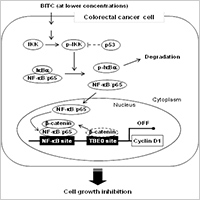Enlarge Image
Seeds of novel anti-cancer drug development: A papaya seed ingredient selectively regulates the proliferation of colorectal cancer cells
In almost all human colorectal cancers, β-catenin aberrantly accumulates in the nucleus and activates the expression of its target genes such as cyclin D1, which contributes to cell proliferation. Isothiocyanates (ITCs), mainly derived from cruciferous vegetables, are well known as having anti-tumor activities in vitro and in vivo. Benzyl ITC (BITC)— an ITC compound derived from papaya seeds— inhibits colorectal cancer cell proliferation, but details of the molecular mechanisms governing this action remain unclear.
Now, Naomi Abe, Yoshimasa Nakamura and colleagues at Okayama University and Kagoshima University have revealed a new molecular mechanism showing that BITC inhibits the proliferation of colorectal cancer cells through NF-κB signaling pathway.
The researchers found that BITC enhanced the nuclear translocation of transcription factor NF-κB in p53-mutated colorectal cancer cells, repressed cyclin D1 transcription by the change of β-catenin binding pattern to the promoter sequence of cyclin D1, and finally inhibited the proliferation of colorectal cancer cells through this pathway. Both p53 and β-catenin ordinarily function in normal cells, suggesting quite a low possibility for BITC to activate the NF-κB pathway and thereby cause side effects.
These findings may contribute to the development of new drugs for colorectal cancer treatment and a deeper understanding of the safety of food chemicals.
Publication and Affiliation
Naomi Abe1,2, De-Xing Hou3, Shintaro Munemasa1, Yoshiyuki Murata1 and Yoshimasa Nakamura1. Nuclear factor-kappaB sensitizes to benzyl isothiocyanate-induced antiproliferation in p53-deficient colorectal cancer cells. Cell Death Dis., 5, e1534 (2014); doi:10.1038/cddis.2014.495
1Graduate School of Environmental and Life Science, Okayama University, Okayama 700-8530, Japan
2Research Fellow of Japan Society for the Promotion of Science
3Department of Biochemical Science and Technology, Faculty of Agriculture, Kagoshima University, Korimoto 890-8580, Japan
*corresponding author, e-mail address: yossan@cc.okayama-u.ac.jp
Journal website: http://www.nature.com/cddis/journal/v5/n11/full/cddis2014495a.html
・Authors: Abe N, Hou D-X, Munemasa S, Murata Y, Nakamura Y
・Title of original paper: Nuclear factor-kappaB sensitizes to benzyl isothiocyanate-induced antiproliferation in p53-deficient colorectal cancer cells
・Journal, volume, pages and year: Cell Death and Disease 5, e1534 (2014).
http://ousar.lib.okayama-u.ac.jp/metadata/53019

